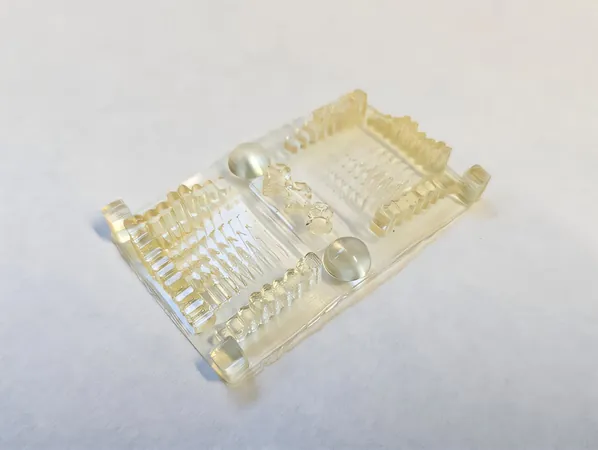
Revolutionary Plant-Based Resins Set to Transform 3D Printing
2025-05-05
Author: Nur
A Greener Future for 3D Printing Begins!
In a groundbreaking development, a collaborative team from Universitat Politècnica de Catalunya—BarcelonaTech (UPC) and the Institute of Chemical Research of Catalonia (ICIQ) has unveiled innovative polymeric resins derived from plant-based materials. This pioneering research, published in RSC Applied Polymers, is set to significantly reduce 3D printing's dependence on fossil fuel-based materials.
Harnessing Nature for Sustainable Manufacturing
The demand for eco-friendly resins in the 3D printing industry is skyrocketing as the world shifts toward sustainable manufacturing practices. The newly developed resins leverage monomers extracted from natural sources like succinic acid, which is found in fruits and vegetables such as corn and broccoli. These resins are designed to be liquid, solvent-free, and provide rapid polymerization, making them ideal for industrial applications.
Behind the Scenes of Innovation
The research journey unfolded in two pivotal stages. Initially, the UPC team formulated the plant-based resin under the leadership of Elaine Armelin, a key figure in the Innovation in Materials and Molecular Engineering—Biomaterials for Regenerative Therapies (IMEM-BRT) group. The second phase saw the ICIQ's Knowledge and Technology Transfer division, guided by researcher Fernando Bravo, proceed to print with the freshly developed resin.
Fueling the Green Revolution in 3D Printing
This remarkable endeavor is part of the Base-3D project spearheaded by CIM UPC, aimed at pushing the boundaries of additive manufacturing while promoting its integration across various sectors in Catalonia—spanning industries, surgical theatres, and educational institutions. This initiative marks the second successful type of polymeric resin developed through the Light3D cluster of the Base-3D project, following a previous biodegradable polymer that excelled in digital light processing (DLP) printing.
Exploring New Frontiers in Sustainability
The IMEM-BRT group is also exploring a range of soft biopolymers—including alginate, chitosan, and gelatin—as potential sustainable superabsorbent materials. These advancements could revolutionize applications in soil enhancement, battery technology, and even desalination processes.
Get ready to witness a monumental shift in the 3D printing landscape, where sustainability meets innovation, making way for a cleaner, greener tomorrow!
 Brasil (PT)
Brasil (PT)
 Canada (EN)
Canada (EN)
 Chile (ES)
Chile (ES)
 Česko (CS)
Česko (CS)
 대한민국 (KO)
대한민국 (KO)
 España (ES)
España (ES)
 France (FR)
France (FR)
 Hong Kong (EN)
Hong Kong (EN)
 Italia (IT)
Italia (IT)
 日本 (JA)
日本 (JA)
 Magyarország (HU)
Magyarország (HU)
 Norge (NO)
Norge (NO)
 Polska (PL)
Polska (PL)
 Schweiz (DE)
Schweiz (DE)
 Singapore (EN)
Singapore (EN)
 Sverige (SV)
Sverige (SV)
 Suomi (FI)
Suomi (FI)
 Türkiye (TR)
Türkiye (TR)
 الإمارات العربية المتحدة (AR)
الإمارات العربية المتحدة (AR)